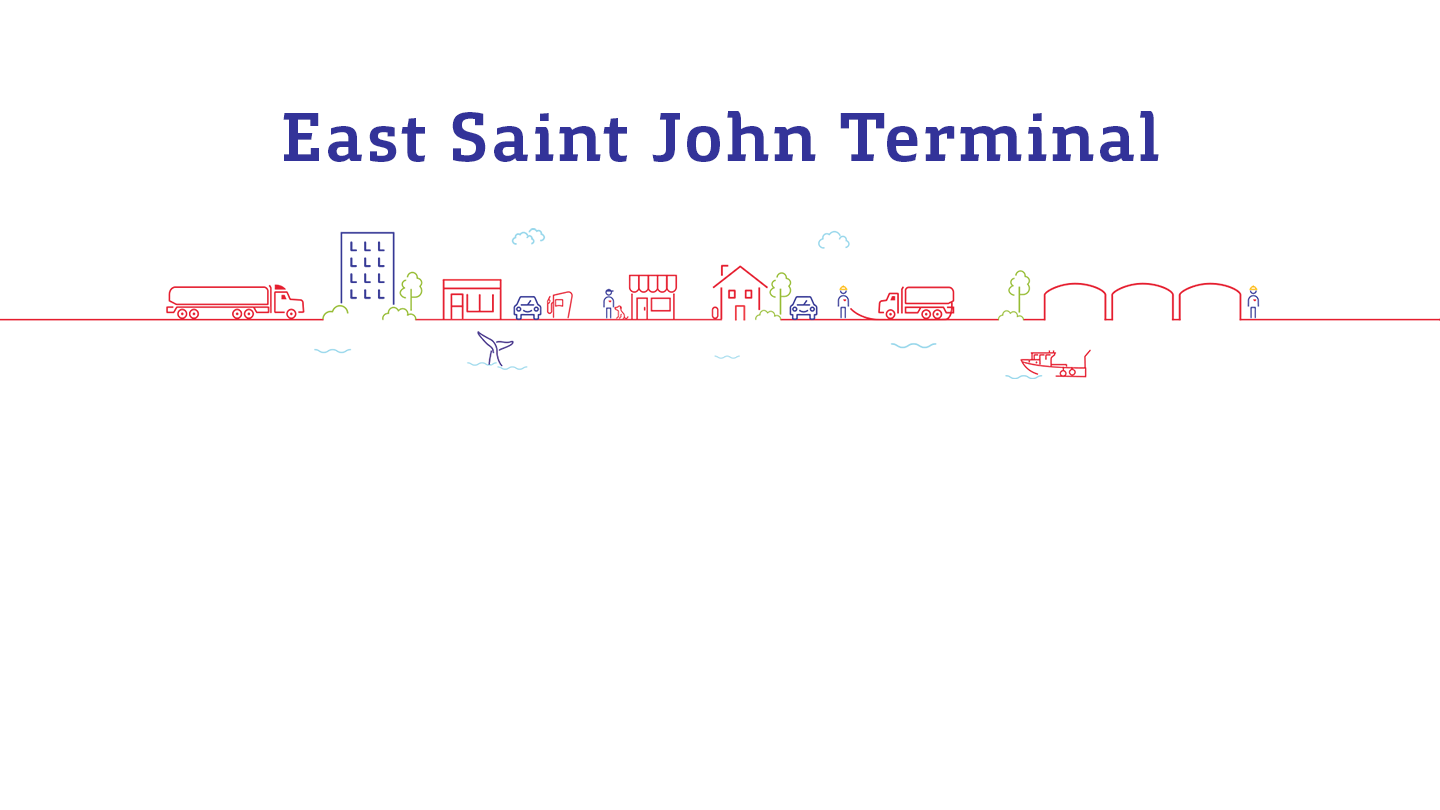
.
Address:
350 Bayside Dr.
Saint John, NB
E2P 1L2
Hours of operation:
24/7, 365 days a year
Our values
At Irving Oil, safety is a core value and is fundamental to how we operate our business every day. We always strive to do the right things, in the right ways, at all times for our employees, our communities and the environment.
About the East Saint John Terminal
The East Saint John Terminal is a marine loading and a rail offloading facility. Products from our Saint John refinery are shipped via a pipeline that runs along River Avenue. Crude oil and butane that are shipped to the facility via rail are transported to the refinery via the same pipe rack.
Products handled at this facility include:
- Petroleum crude oil
- Middle Distillate Hydrocarbons such as heating oil or diesel
- Light Hydrocarbons such as gasoline
- Liquified Petroleum Hydrocarbons such as propane and butane
The following section outlines the potential effects of these substances in the unlikely event of an emergency.
- Petroleum crude oil is a thick black liquid composed primarily of hydrogen and carbon. It is a health hazard and falls under the “pool fire” hazard category under federal E2 Regulations. Exposure to petroleum crude oil can cause eye, skin, gastrointestinal and respiratory irritation; the product may be harmful if inhaled and can contaminate soil and water if released to the environment.
- Middle Distillate Hydrocarbons can release vapours that can form flammable mixtures and can cause eye, skin, gastrointestinal, and respiratory irritation. They may be harmful if inhaled, and can contaminate soil and water if released to the environment.
- Gasoline is an odorous, flammable liquid and can contaminate soil and water if released to the environment. It is a health hazard and falls under the “combustible” hazard category under federal E2 Regulations. Gasoline can be easily ignited by high temperatures, sparks or flames and can create an explosive atmosphere if an unplanned release occurs.
- Exposure to high concentrations of gasoline by inhalation can result in headaches, nausea, dizziness, and/or a burning sensation in the chest. Direct contact can cause skin irritation.
- Butane is a health hazard and falls in the “explosion” hazard category under federal E2 Regulations. Butane is a flammable liquified petroleum gas; the additive Mercaptan in butane may cause a rotten egg smell. Direct contact with butane may cause injury.
- Propane is a flammable liquid and a compressed gas. Propane can be easily ignited by high temperatures, sparks or flames.
- Propane is a health hazard and falls in the “explosion” hazard category under federal E2 Regulations. Exposure to high concentrations of propane can result in headaches and other symptoms of the central nervous system, such as nausea and dizziness. Overexposure may lead to vomiting and fatigue; as a worst-case scenario, if oxygen levels are sufficiently reduced, unconsciousness and death can occur.
Our safety commitment
Irving Oil has a rigorous emergency management program in place to prevent, prepare for, respond to, and recover from incidents. Across our operations, these plans are part of our standard procedures. At our East Saint John Terminal, our emergency management plans are based primarily on prevention, with equipment inspection and maintenance programs in place. In addition, employees are trained in detailed operating and emergency procedures with a constant focus on safe and efficient operations.
In the unlikely event of an emergency at our East Saint John Terminal, we wish to share the following information with our neighbours.
Irving Oil’s website and social media platforms are the best places to find the latest information about our operations:
Website: irvingoil.com
Facebook: facebook.com/irvingoil
In the unlikely event of an emergency on site, Irving Oil will notify local authorities immediately, and work proactively to help protect public safety. Please follow instructions provided by your local authorities. If an incident has occurred, please refrain from visiting the facility. It is possible that you may smell an odour; this does not always signify danger.
The Saint John Fire Department Station 4 and Saint John Emergency Management Organization will follow internal protocols in the event of an emergency at this facility. If you become aware of an incident, please call 911. The Saint John Fire Department Station 4 can also be contacted at 506.658.4455.
The Saint John Emergency Management Organization offers an Emergency Alert Service that allows residents to be notified by email or phone of a potential emergency. In order to receive notification through this service, please visit saintjohn.ca or contact the City of Saint John at 506.658.2910.
Please note that Irving Oil will not provide instructions on matters of public safety such as evacuation protocols as this is the jurisdiction of the local authorities.
For more information
If you are interested in learning more about our facility, we encourage you to contact us at [email protected] or 1.888.310.1924.
